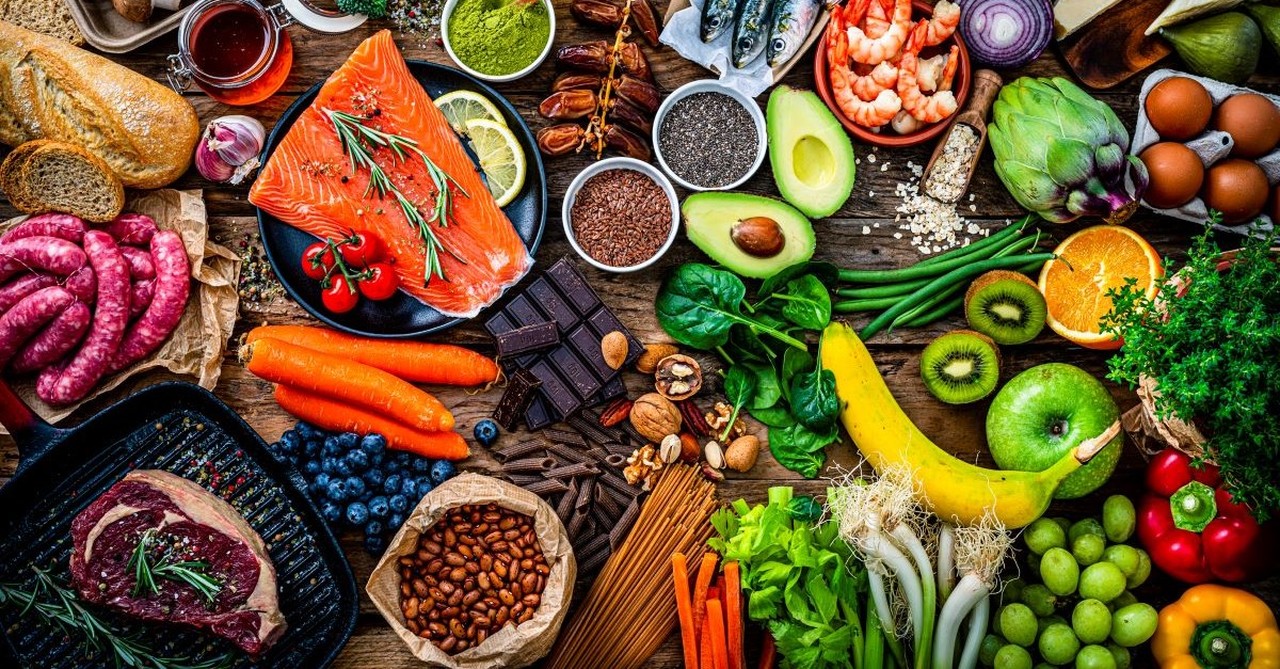
In a busy and stressful world filled with fast food and meals on the go, it can be easy to lose sight of the sacred nature of eating. It’s a blessing to be able to eat healthy and delicious food – and to be able to enjoy it fully, with all of our senses. Mindful eating is a spiritual practice that allows us to slow down and savor our food as a gift from God. By paying full attention to our eating experience through mindfulness, we can turn our meals into worship times and strengthen our connection with God. Here are five simple ways to practice mindful eating as a Christian.
Photo Credit: ©GettyImages/fcafotodigital
1. Give Thanks and Bless Your Food

1. Give Thanks and Bless Your Food
SLIDE 1 OF 5
Before taking a single bite, pause to give thanks. Offering a grateful prayer before your meal helps to center your mind on the blessing in front of you and allows you to express appreciation for God as your ultimate provider.
Reflect on where your food comes from – the farmers who grew it, the people who prepared it, and the journey to reach your plate. Consider God’s excellent design for nature that allows plants and animals to thrive, which makes it possible for you to eat well.
Jesus gave thanks before breaking bread (Luke 22:19). By following his example, you can develop an attitude of gratitude. Instead of rushing through a quick, routine prayer, take all the time you need to express your appreciation fully. As you eat, think about your thankfulness by savoring each bite, appreciating the flavors, and being mindful of how the food nourishes your body. Gratitude can transform the act of eating even a simple meal into an act of worship.
Could you consider incorporating scripture into your prayers at meals? Short Bible verses about God’s provision can work exceptionally well – such as Psalm 136:25: “He gives food to every creature. His love endures forever.” After eating, thank God for the nutrition and energy he gave you through your meal. Saying a prayer after your meal completes your worship experience.
Photo Credit: ©GettyImages/shapecharge
2. Eat with Awareness

2. Eat with Awareness
SLIDE 2 OF 5
Distraction is one of the greatest barriers to mindful eating. Scrolling through your phone, watching TV, thinking about your to-do list, and other distractions distract you from fully experiencing your meal. You can eat with awareness by being entirely focused on eating and engaging all your physical senses of sight, smell, taste, touch, and even hearing.
Savor your meal as a good gift from a good God. The Bible encourages you in 1 Corinthians 10:31: “So whether you eat or drink or whatever you do, do it all for the glory of God.” Start by studying your food. Notice the bright colors of the vegetables, the rich textures of the grains, and the delicious scents of everything on your plate.
Consider how the meal is arranged and the creative variety of ingredients. Noticing these details helps you appreciate God as a Creator who designs food with beauty and order. Every meal can remind you of the creativity and love that God pours into his creation.
When you take a bite, chew slowly and carefully, appreciating the flavors as you notice them. Let each bite linger in your mouth, savoring the richness of the food. Notice how different foods have different textures – some are crunchy, and others are smooth or tender. Let yourself feel awe of the diversity in the world God has made. Eating with awareness becomes an opportunity to align your actions with your faith since it reminds you that even in the everyday act of eating, you can glorify God.
Photo Credit: ©GettyImages/Choreograph
3. Appreciate the Gift of Community

3. Appreciate the Gift of Community
SLIDE 3 OF 5
Sharing a meal with others is a powerful way to practice mindful eating. Throughout the Bible, you can read about people enjoying meals together for fellowship and celebration. Jesus often gathered with his disciples around food, and the early Christians ate together regularly.
Acts 2:46 describes the early Christians: “They broke bread in their homes and ate together with glad and sincere hearts.” That shows the importance of eating in the community and how eating together can strengthen the connections between people. Eating together is not just about sharing food; it’s also about sharing life to build close relationships. When you eat with others, take the time to enjoy good conversations.
Put away phones and turn off the television so you all can focus on the present moment. Listen well to those around you when they talk and enjoy their company.
Beyond eating with your family and friends, try to practice hospitality with people you don’t know well when possible. Open your home when you can to share meals with people in your community who you would like to encourage and get to know better. Each meal you share mindfully can create a space for God’s love to flow between you.
As you eat, consider the unity you share with Christians worldwide who are doing the same thing – experiencing God’s love together while eating and talking. In addition to the people you share a meal with, it’s important to recognize the community involved in getting it to your table.
Reflect on all the people who were part of the food’s journey—the farmers who grew the crops, the workers who harvested them, the delivery truck drivers, and the grocery store employees who transported and sold the food. These people are part of the broader community that makes your meal possible. Thinking gratefully about their work is a way to honor them and God for making it all possible.
Photo Credit: ©Getty Images/Jack Hollingsworth
4. Listen to Your Body’s Signals

4. Listen to Your Body’s Signals
SLIDE 4 OF 5
God has designed your body with a system that signals when you’re hungry and full. However, you may ignore these cues when stressed, eating out of stress rather than actual need. Mindful eating helps you to pay attention to these signals and to honor God by taking good care of your body as you respond to them thoughtfully. As Proverbs 22:3 says: “The prudent see danger and take refuge, but the simple keep going and pay the penalty.” So, before you sit down to eat, check in with yourself. Ask yourself whether you’re truly hungry, simply eating out of habit, or for emotional reasons – because you’re bored, stressed, want to feel comforted, etc.
Are you craving food because your body asks for more physical energy, or are you reaching for something to fill an emotional need?
This self-awareness can help break cycles of mindless eating and empower you to make healthier choices. As you start eating, take small, deliberate bites and pause between each one. Tune into how your body feels as you eat, and notice how you gradually feel more full. When paying attention, you may be surprised at how quickly your body responds to food.
Slowing down and chewing your food thoroughly gives your digestive system the time it needs to process the meal. It also creates space for you to check in with yourself as you eat before going for a second helping. Are you beginning to feel full, or are you still hungry?
You may find that when you eat with awareness, you naturally begin to feel satisfied sooner. Eating slowly gives your stomach time to signal to your brain that it’s full so that you can avoid overeating. It’s also important to notice how different foods make you feel. Some foods may energize you, while others may make you feel sluggish or uncomfortable. Doing this can help you make more intentional choices about what to eat. You’ll honor God by making healthy food choices that fuel your body’s well-being because your physical health is spiritually essential.
Photo Credit: ©iStock/Getty Images Plus/PeopleImages
5. Reflect on God’s Generosity

5. Reflect on God’s Generosity
SLIDE 5 OF 5
Mindful eating is an opportunity to meditate on how generously God provides for you. Every meal can remind you of God’s faithfulness in giving you abundant food to enjoy. It’s easy to take food for granted, but when you slow down and reflect on the many blessings behind each meal, you can discover God’s wonder in your daily life and trust God more to meet your daily needs.
Psalm 34:8 encourages you to: “Taste and see that the Lord is good; blessed is the one who takes refuge in him.” So, savor the goodness of God’s creation!
Celebrate how every meal and snack you eat is ultimately a gift from God. When you reflect on God’s generosity while you eat, you can experience God’s goodness and faithfulness tangibly. Your loving Heavenly Father has given you a vast variety of nutritious and delicious food. The wonder of a sweet apple or a comforting bowl of soup – and any food you enjoy – shows how God generously cares for you. Through mindful eating, you can build your trust that God will continue to meet your needs.
Mindful eating as a Christian is an important spiritual discipline that can strengthen your relationship with God. You can change any meal or snack from a rushed activity that you don’t enjoy much into a sacred worship experience with God, who makes it possible for you to eat well. In the process, you can take better care of your God-given body, develop a deeper appreciation for the blessings God gives you, and enjoy being inspired by wonder while you eat!
Photo Credit: ©Getty Images/Povozniuk

Originally published April 08, 2025.






